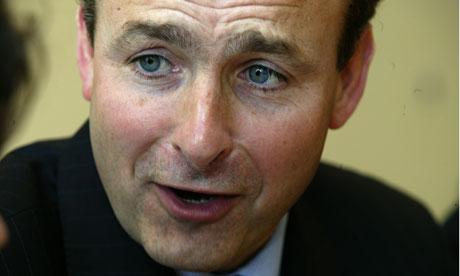Skeletons in Micheal Martin's closet

As journalists awaited the resignation of Uachtarán Fhianna Fáil last Saturday, many asked where it all went wrong for Brian Cowen. His downfall could not have contrasted more with the ecstasy of his inauguration as party leader in 2008, a united Fianna Fail fully behind Bertie's 'chosen one'. The first Lisbon Treaty of that year was cited as the beginning of his descent in public opinion: Brian Cowen admitted to not reading the Treaty in full. (It would have been more worrying had he indeed read the impenetrable legal document, but it looked bad.)
The failed referendum was an embarrassment in Europe, the imposition of Lisbon II an insult to many at home. The financial crisis will forever be linked to Brian Cowen, heightened in Ireland by mismanagement of the economy by Cowen and others. And the State guarantee of all banks that followed. Arguably, it was the abrogation of any responsibility for the crisis that marked the end for Fianna Fail. But for Brian Cowen, more blunders followed: the "drink-in" at the Ardilaun Hotel, the wresting of details in the Dail about a golf game with Anglo bankers, and finally, the botched face-lift to Fianna Fail's front bench.
Journalists on RTE Radio One concluded in the hour before his resignation that Brian Cowen's past came back to haunt him. Though his actions in the present didn't help either. And they speculated that the same fate could befall either Brian Lenihan or Micheal Martin as party leader (other candidates were excluded as likely leaders).
In campaigning for the Fianna Fail leadership, Micheal Martin (pictured) has extolled his tenure as Minister for Health. One lingering skeleton from this time could yet emerge to haunt Micheal Martin. It relates to another incidence of failing to read a document, but this case is truly embarrassing.
It centres on the scandal that emerged in 2005 of elderly patients who were charged for public beds in nursing homes. The episode is summarised by Fintan O'Toole in "Enough is Enough: How to Build a New Republic".
"About €2 billion had been taken unlawfully by the state from vulnerable citizens. Who was responsible?
"In 2003 the Minister for Health Micheal Martin (along with his special advisors and junior ministers) was given a briefing document that disclosed the scandal, but did nothing. Why? Because, he explained, he did not read the brief. Here is evidence to an Oireachtas committee on the question of responsibility (the Travers report was a bland official report on the affair).
Deputy McManus: This will cost the State a significant amount and the longer it has gone on, particularly since 2001, the more costly it has become. Who is responsible?
Deputy Martin: I accept the conclusion of the Travers Report that it was a long-term systemic corporate failure.
Deputy McManus: Who is responsible?
Deputy Martin: I have answered.
Deputy Twomey: Is the Minister saying he is responsible?
Deputy Martin: No. I agree with the conclusions of the Travers Report, about which the committee is well aware going back to 1976.
Deputy Twomey: If so, the Minister is saying he is responsible because under the Public Service Management Act 1997, he is responsible.
Deputy Martin: The Travers Report makes a clear differentiation in terms of where he lays responsibility, He has made a determination on this and he gives the reasons, which relate to the principles, people's worries about finding and so on. He outlines ten reasons towards the end of the report. I accept that and I do not argue with his fundamental conclusions.
Deputy McManus: I am still trying to get an answer. I asked the Minister who is responsible. Is he saying that, as Minister, he does not bear any responsibility for this?
Deputy Martin: I am, I do not.
'Yes, Minister' couldn't have scripted it.
Photo: info-wars.org
